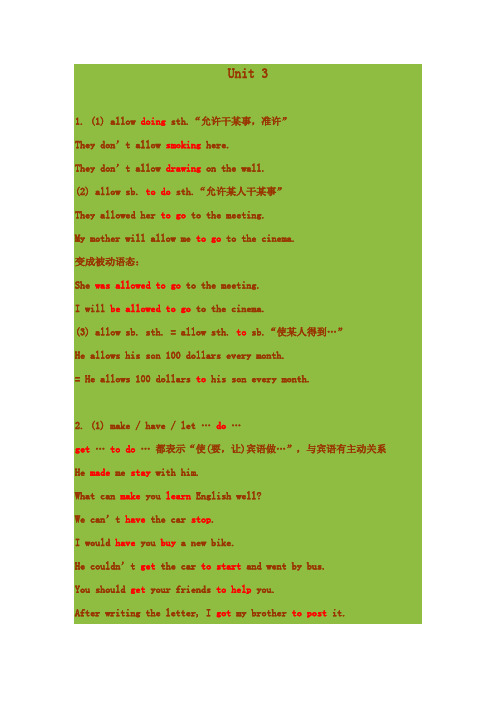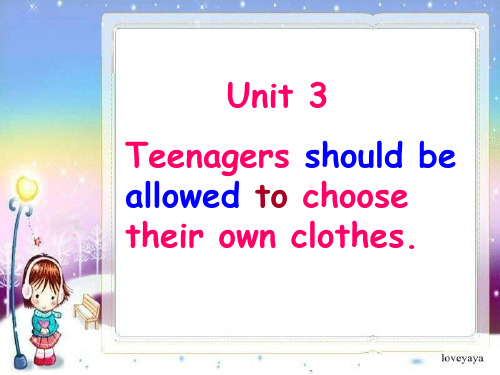九年级英语Unit_3被动语态课件人教版新目标
- 格式:ppt
- 大小:1.47 MB
- 文档页数:66

九年级英语Unit3重要短语归纳(新目标英语)九年级英语Unit3重要短语归纳九年级英语Unit3语态:①英语有两种语态:主动语态和补动语态主动语态表示是动作的执行者被动语态表示主语是动作的承受者cats eat fish.猫吃鱼。
Fishiseatenbycats. 鱼被猫吃。
②被动语态的构成由“助动词be+及物动词的过去分词”构成助动词be有人称、数和时态的变化,其变化规则与be 作为连系动词时完全一样。
时态被动语态结构例句一般现在时aare+过去分词isEnglishisspoeninanycountries.一般过去时as+过去分词ere+过去分词Thisbridgeasbuiltin1989.情态动词can/shoulday+be+过去分词ust/……Theorustbedonerightno.③被动语态的用法当我们不知道谁是动作的执行者,或者没有必要指出谁是动作的执行者,或者只需强调动作的承受者时,要用被动语态。
allosb.todosth.允许某人做某事如:otherallosetoatchTVeverynight.妈妈允许我每晚看电视。
bealloedtodosth.被允许做某事如:LiLyisalloedtogotoQinzhou.莉莉被允许去钦州。
gettheirearspierced穿耳洞让/使做某事getsth.donehavesth.done如:Igetycarade.==Ihaveycarade.我让别人修好我的车enough足够形容词+enough如:beautifulenough 足够漂亮enough+名词如:enoughfood足够食物enoughto 足够…去做…如:IhaveenoughoneytogotoBeijing.我有足够的钱去北京。
Sheisoldenoughtogotoschool.她够大去读书了。
stopdoingsth.停止做某事Pleasestopspeaing.请停止说话。

Unit 31. (1) allow doing sth.“允许干某事,准许”They don’t allow smoking here.They don’t allow drawing on the wall.(2) allow sb. to do sth.“允许某人干某事”They allowed her to go to the meeting.My mother will allow me to go to the cinema.变成被动语态:She was allowed to go to the meeting.I will be allowed to go to the cinema.(3) allow sb. sth. = allow sth. to sb.“使某人得到…”He allows his son 100 dollars every month.= He allows 100 dollars to his son every month.2. (1) make / have / let …do…get…to do…都表示“使(要,让)宾语做…”,与宾语有主动关系He made me stay with him.What can make you learn English well?We can’t have the car stop.I would have you buy a new bike.He couldn’t get the car to start and went by bus.You should get your friends to help you.After writing the letter, I got my brother to post it.(2) get / have + 宾语 + 动词过去分词表示“主语使得别人做了某事”与宾语有被动关系I’ll go and get my hair cut (过去分词).My watch is broken; I’ll get it mended.I’ll have my hair cut tomorrow.They have just had their car repaired.(3) 当make用于被动语态中时,不定式必须带toThey made her stay for dinner. (动词原形)She was made to stay for dinner.She was made to wait for hours.3. (1) own形容词“自己的”用在所有格后加强语气I saw it with my own eyes.Please describe this picture in your own words.one’s own + 名词 = 名词+ of one’s own“某人自己的…”This is my own house.= This house is my own.That’s my (own) bike.= That’s a bike of my own.(2) own动词“拥有,所有”Many people own cars now.(3) owner名词“所有者,拥有人,主人”Who is the owner of this house?He used to own this car.= He used to be the owner of this car.(4) oneself表示“某人自己本身”You must look after yourself.(5) on one’s own“独立地,自愿地”I did that thing on my own.4. (1) stop to do sth.“停下手头所做的事去做另一件事”He stopped to have a look at the boy.(2) stop doing sth.“停止做正在做的事”Why did he stop talking?(3) stop sb. from doing…“阻止某人做某事”The workers had to work for hours to stop the ship from going down.(4) can’t stop doing sth. “忍不住…,无法不…”I couldn’t stop laughing when I heard it.5. (1) need to do sth.“需要做某事”Your parents aren’t at home; you need to cook by yourself today. We need to wear cool clothes in summer.注意:This pair of shoes needs mending.(表被动关系)(2) There is no need to thank me.need为不可数名词“需要,必要,缺乏”There is no need to worry about her.There is no need to set off so early.(3) There is no need (for sb.) to do sth.= It is not necessary (for sb.) to do sth.“没有必要…”There is no need to come so early.=It’s not necessary to come so early.There is no need for you to finish the work today.=You don’t have to finish the work today.(4) There is no need of / for…There is no need of / for money.There is no need of / for hurrying.6. (1) so + be / 助动词 / 情态动词 + 主语表示“另一个主语也…”Lucy finished her homework, so did Lily.Li Mei was late. So were you.If you can finish it in time, so can we.If you go to the cinema tonight, so shall I.(从句用一般现在时代替一般将来时)Tom speaks French. So do I. So does his brother.A: I went to the cinema yesterday.B: So did I.(2) Neither / Nor + be / 助动词 / 情态动词 + 主语表示“另一个主语也不…”Bob didn’t come to school yesterday. Neither / Nor did Tom. If you don’t go, neither / nor will I.(3) so + 主语 + be / 助动词 / 情态动词表示“主语确实…”赞成前一种说法He is a clever boy. --- So he is.Tom hopes to be a teacher. --- So he does.7. by + 时间表示“不迟于,到…为止,到…之时”(1) By the end of last year we had planted 3000 trees.(2) We have learned about 1500 English words by now.(3) By this time tomorrow I will have finished the work.8. concentrate“集中(注意力,精神等),专心,全神贯注于…”常与介词on / upon连用I must concentrate on my new job.I can’t concentrate upon my work when I’m hungry.The terrorists concentrated their activities on the big cities. Mike concentrates more on the computer than his studies.9. (1) keep doing sth. “继续做某一相同的动作”之间无停顿,表示状态和动作的持续He kept telling me to be careful on the trip.He kept standing there for an hour without moving.(2) keep on doing sth. “经过一段时间的间隙后继续做同一件事”强调动作的反复He kept on teaching as though nothing had happened.They kept on working in the field, though it was raining.(3) keep … doing sth.“使…处于做某事的状态”I’m sorry to keep you waiting for a long time.The teacher kept him standing there for an hour.(4) keep … from …和keep … from doing …表示“阻止(防止 / 避免)某事的发生或某人做某事” from不可省略I mustn’t keep you from your work.我不该打扰你的工作.I tried to keep him from going out.You should keep your room from getting dirty.10. (1) perform“表演,演出”The tigers performed well at the circus.perform a part in a play(2) perform“执行,履行”I have performed all my duties.11. (1) would like to do sth.would most like to do sth.I’d like to improve my English.What kind of food would you most like to eat?(2) feel like doing sth.= would like to do sth.= want to do sth. “想要做某事”She feels like watching TV.= She would like to watch TV.I want to have a trip to Tibet.(3) want doing sth. “需要干某事”用主动结构表示被动关系My watch wants (needs) mending.12. (1) decide + 名词 / 代词I can’t decide the date of the trip.(2) decide (not) to do sth.They decided to stay here.The girl decided not to be a nurse.decide相当于make up one’s mind“下定决心,打定主意”I’ve made up my mind to go abroad for further study.We have made up our minds that we will never make the same mistake any more.(3) decide + 疑问代词 / 副词 + 动词不定式Have you decided where to go yet?(4) decide + 从句Let’s first decide where we will go next?We decided (that) we didn’t take part in the football match.It’s difficult to decide who is right.13. (1) volunteer动词“自愿,自愿服务”He volunteered to do the work.Jenny volunteered to clean up the classroom.He volunteered for guard duty.(2) volunteer名词“志愿者”Who can have a volunteer to collect the glasses?Any volunteers?14. (1) I wish you success!The meeting was a great success.(2) She succeeded as a teacher.Did he succeed in solving the money problem?(3) The operation(手术) was quite successful.He was successful in his business.(4) Our country has sent up many satellites into space successfully.15. (1) get in the (one’s) way “妨碍”Computer games can get in the way of your schoolwork.The heavy rain got in our way of having the sports meeting.(2) get … out of the (one’s) way “使…不妨碍某人的路”We have to get the stones out of our way.16. (1) 主语(物) + happen + to sb./ sth.“某人(物)发生…”The accident happened this morning.I wondered what had happened to him.What’s happening to the forest?If anything happens to him, let me know.(2) 主语(人) + happen to do sth. “某人碰巧、恰巧做某事”She happened to go / be out when I phoned her.I happened to see him on the street.It happened that I saw him in the reading room.(3) happen强调“事情的偶然性发生”happen --- take place指“经过安排,筹划的有计划发生”The Olympic Games take place every four years.Great changes have taken place in our country.The dance will take place on Saturday night.When will the meeting take place?17. (1) sleep名词和动词“睡觉”He had a good sleep. (名词)Last night I slept very well. (动词)(2) asleep形容词“睡着的”只用作表语The child has been asleep.若表示“睡着的”作定语修饰名词用sleeping 如:the sleeping dog(3) sleepy形容词“困乏的,想睡觉的”I feel very sleepy now.标签: 教学笔记 .。




新目标英语初中被动语态讲解及练习一、动词有两种语态:主动语态和被动语态。
主动语态表示主语是谓语动作的执行者;被动语态则表示主语是谓语动作的承受者。
二、被动语态的构成基本结构是:“助动词be+及物动词的过去分词”。
各种时态的主动语态和被动语态的相互变化关系见下表:主动语态被动语态一般现在时do/does am/is/are+done一般过去时did was/were+done含有情态动词can/may/must/need/should...+do can/may/must/need/should...+be+done一般将来时现在进行时过去进行时将来进行时现在完成时过去完成时三、主动语态变被动语态的方法1.转换示意图:2.主动语态变被动语态的步骤①时态与原句保持一致。
②把主动语态的宾语变为被动语态的主语(如果是人称代词,要将宾格变为主格)。
③把谓语变成被动结构“be+过去分词”结构(要注意原句的时态和主语的单复数)。
④把主动语态中的主语改为by构成的介词短语,放在谓语动词之后(by短语有时可省略)。
如:We clean the classroom every day. 我们天天打扫教室。
→The classroom is cleaned (by us) every day. 教室天天(被我们)打扫。
We must send the girl to the hospital at once. 我们必须马上把这女孩送到医院。
→The girl must be sent to the hospital at once (by us). 这女孩必须马上(被我们)送到医院。
四、被动语态的用法1.不知道谁是动作的执行者时。
如:Some new computers were stolen last night. 一些新电脑在昨晚被盗了。
(不知道是谁偷的) 2.没有必要指出谁是动作的执行者时。
如:Books mustn’t be taken out of the library.书不准被带出图书馆。
Unit 3 Teenagers should be allowed to choose their own clothes[教学过程] 一、教学目标:☆ 1、谈论人们认为中学生可以或不可以做的事情。
☆2、学会表达对有关规定的态度和看法,并提出改进意见,能运用已掌握的语言知识 简单地阐明理由。
☆3、作为中学生我们应该正确看待家规、班规、校规等,并能认真遵守。
driver s 'license, wild, serious, calm, young, get one ' s ears pierC 给某人扌L 耳朵 concentrate on 全神贯注;专心于 have an opportunity to do 有机会做某事 / 考试不及格 cut one ' s h 理发 be strict with sb. 对某人严格要求worry about 为 担心(焦虑)see sb. doing 看见某人正在做某事 care about 担心;关心2、 Important sentences :-- I think students should be allowed to do homework with friends. -- I disagree. They talk instead of doing homework. -- Sixteen-year-olds should not be allowed to drive. -- I agree. they aren ' t serious enough at that age.-- Do you think sixteen-year-olds should be allowed to work at night? -- No, I don ' t. 3、 Grammar :被动语态( Be + done )三、具体知识讲解:语法: 被动语态:句子的主语是谓语动词的动作的承受者或者主语是动作的对象,因此只有 及物动词才有被动语态。